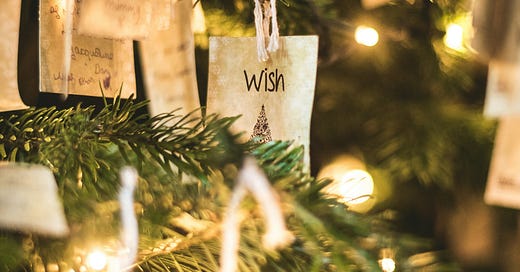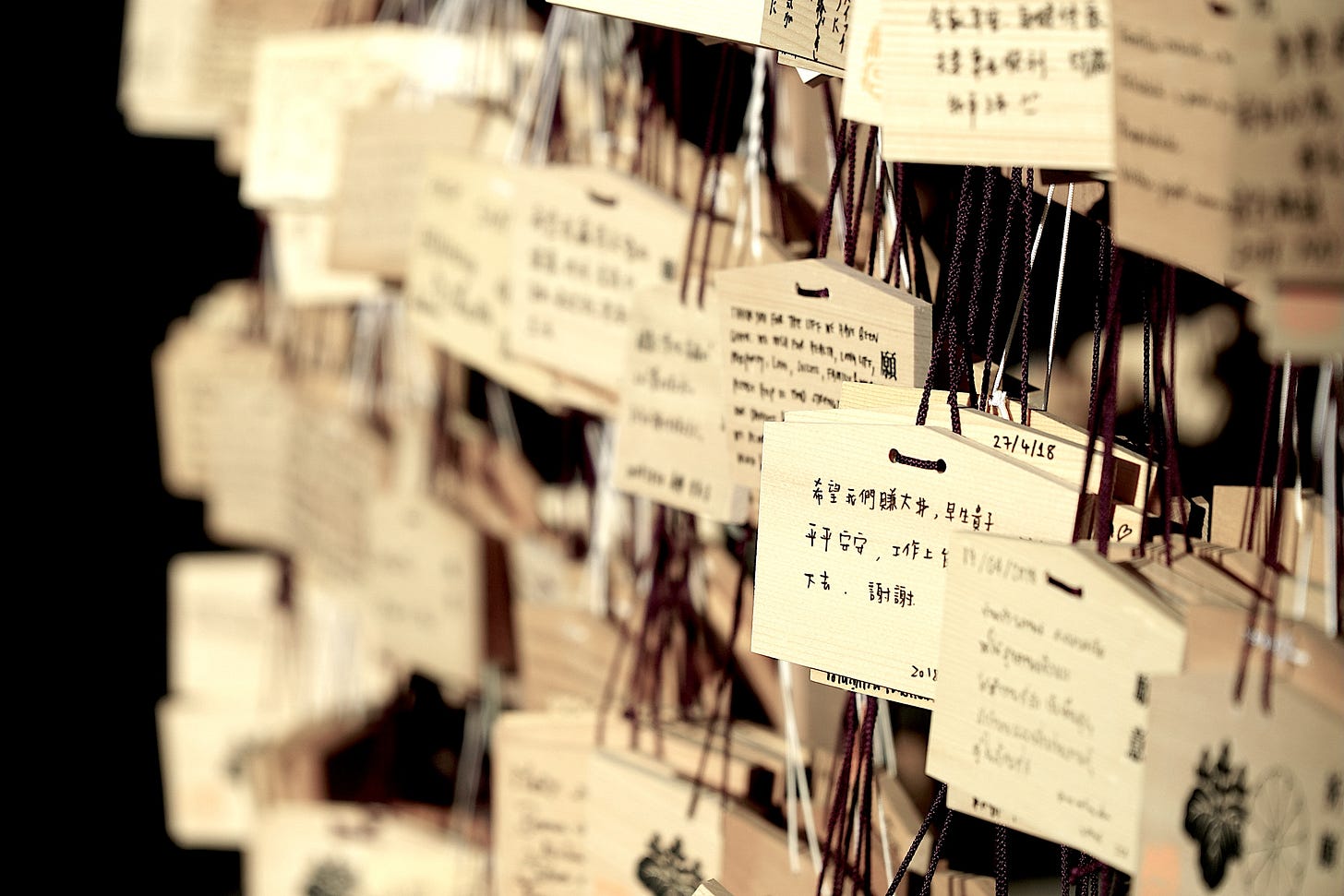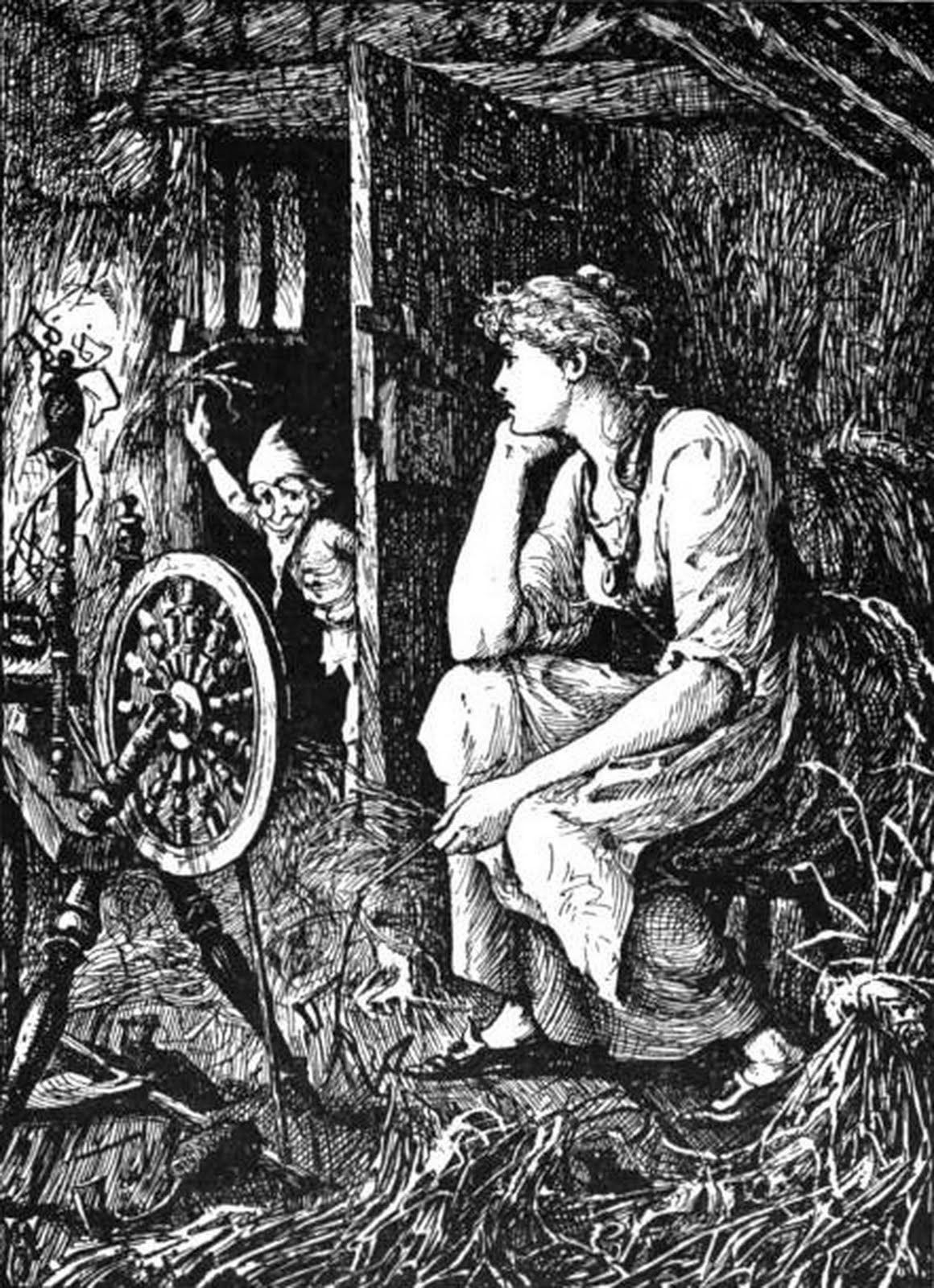Wishes are memories coming from our future.
〰 Rainer Maria Rilke 〰
Three Wishes
If you wish to make an apple pie from scratch, you must first invent the universe.
〰 Carl Sagan 〰
One of the oldest tales of Three Wishes is told in the Upanishads, a sacred Vedic collection of texts handed down in the Hindu religion.
In this allegorical story, Nachiketas is sacrificed to the gods by his father, the sage Vājashravas. When the child protagonist arrives at the Gates of the Otherworld, Yama, the god of Death, happens to be away.
Upon his return, Yama falls into an apologetic mood. Having breached the rules of hospitality, he offers to grant the boy three wishes.
In the following dialogue, Nachiketas asks (1st) for the happy return to his father, and (2nd) for initiation into the secrets of the sacred fire which leads to heaven. Both wishes are granted.
Nachiketas’ 3rd wish proves a little more tricky. Curious about the question of immortality, he asks “Does the person continue to exist after death?”
“Even the gods are not sure about this,” Yama sidesteps a direct answer and tries to tempt the youngster with material wealth, status, and other trappings of the human earthly realm.
Nachiketas refuses to accept these distractions and sticks to his third wish. “Tell me about immortality,” he insists. “What happens after we die?”
Eventually, Yama explains that humans have to choose between two paths. The path of wisdom leads to Atman (= the Soul / Self), the path of ignorance leads to worldly pleasures.
“The good is one thing, the pleasant is another,” the God of Death says, before revealing the secret of immortality. “Having examined both, wise humans distinguish one from the other. They prefer the good to the pleasant.”
The allegory of Nachiketas’ Three Wishes coils around two central strands:
1 ~ The Immortality of Atman (or Soul) throughout the cycle of death and rebirth, and
2 ~ The Importance of Choice (or Free Will) in the human course from ignorance towards knowledge.
Both strands are spun from the fibres of wishes born in the human mind.
Three Wishing Trees
Trees in temple courtyards were always filled with people's wish knots,
which looked like white flowers blossoming.
〰 Yoko Ono 〰
One of the oldest Wishing Trees of the world must be Yggdrasil, better known as the World Tree, from Norse Mythology. Yggdrasil has three roots stretching deep into the earth, each connecting to its own well.
The Well of Urd is located in the Land of the Gods and is said to be the source of all memories and knowledge in the universe. Urd is guarded by the three Norns ~ aka Fates in Roman mythology ~ who spin the threads of destiny for all beings.
The second root reaches to the Well of Mimir in the Land of the Giants and is the source of wisdom. The water from this well can be sourced through hard work or by sacrifice. Wisdom can be gained from beings beyond one’s own realm.
The Well of Hvergelmir feeds the third root and is guarded by a dragon. Hvergelmir represents chaos, the destructive forces of the universe, which is also the source of creativity.
Mimir is the one associated with all ancient Wishing Wells in Northern Europe. The tradition of making a wish and throwing a coin or other token into a ‘holy well’ may well have sprung from this second root of the ancient World Tree.
In Asia, the soil of Hinduism, Jainism, and Buddhism has sprouted a wish-fulfilling tree called Kalpavriksha. This specimen originates from an era known in Hinduism as the ‘Churning of the Ocean’.
Kalpavriksha was born alongside the divine cow Kamadhenu, and together they ensure human survival. The sacred bovine goddess is said to provide humans with all their physical needs. She is the source of veneration of cows in India to this day.
The mystical tree herself is believed to possess the power to grant any wish, whether in the physical, material, or spiritual realms.
Kapalvrishka has survived in many trees of a wide range of species across Asia and beyond, including banyan trees in India and China, fig or mulberry trees in Southern Europe, oak trees in England and the Scottish Highlands, plus hawthorn, ash, elms, apple or any tree growing next to a holy well.
Even the roots of the Christmas tree tradition can be traced back to this ancient tree who has served as a repository and amplifier of human wishes for millennia.
The tradition of making wishes on a tree is not only alive in Asian religions, Shamanism and European Paganism ~ and it shows no signs of dying out.
In 1996 Yoko Ono initiated an art project called Wish Tree. The concept is simple “Make a wish. Write it down on a piece of paper. Fold it and tie it around a branch of a Wish Tree. Ask your friends to do the same. Keep wishing. Until the branches are covered with wishes.”
Yoko Ono’s project has brought Wish Trees to museums, galleries, and sculpture gardens in Helsinki, London, Washington, New York, and many other places all over the world.
In 2007, over a million wishes were collected and buried at the base of the Imagine Peace Tower on Viðey Island in Kollafjörður Bay in Iceland ~ an installation in memory of John Lennon and his undying wish for world peace.
Straw into Gold
Wishes were dangerous things.
That was the idea you got from fairy tales.
〰 Kate Dicamillo 〰
Wishing was originally a stunningly powerful function, a supernatural gift bestowed to the human mind.
In its youth, brimming with vitality, the word wish was buzzing with associations of winning, wisdom, and extraordinary ways for humans to fulfil their potential.
Wishes held the distinct possibility of communicating with supernatural beings ~ a fairy godmother to protect you, a leprechaun who’d spin straw into gold in a heartbeat, a talking fish caught in an unsuspecting fisherman’s net, a servile jinn emerging from a rusty old oil lamp.
Wishes were the epitome of beauty, wealth, and perfection. Pregnant with the promise of receiving extraordinary gifts, or transforming a lifelong struggle into an actual happily ever after reality, they were on a par with a magician’s wand and divine miracles.
This was common knowledge about 500 years ago. Until then, Wunsch ~ the German cognate of the English wish ~ stood strong, prominent, and brilliant, a shining symbol for divine flawlessness, the extraordinary in all its abundance, special powers transferred to humans by the grace of God or a supernatural being.
As you might suspect, such powerful characters have their dark side too. A fulfilled wish could turn out to be a curse instead of the desired blessing. A nightmare follows, rather than a dream come true.
Like any word, wish could show up in an altered guise and mean different things, depending on the context.
In a religious setting, wish was used in the sense of the creative power of the word of God.
In fairytales, wishes came true, even if the protagonist made one mistake after another, behaved like a loser, and failed at every step.
In folklore and nature religions, wishes restored health, provided prosperity, and made dating apps pale into insignificance.
In political and social systems, wishes of alphas, bullies, and damsels in distress were taken as commands.
This fabulous word, with the mythical gift of magic, is an etymological relative of win, winsome venerate, venerable and Venus, the goddess of beauty, harmony, love and sexual desire. If it wasn’t for the troublesome cousin venom, it would be the most perfectly happy word family ever after.
Wishes into Action
Peace is not something you wish for;
It's something you make,
Something you do,
Something you are,
And something you give away.
〰 John Lennon 〰
Over the past centuries, wishes have lost their fulfilling power (at least in the minds of most Western humans). Wishing has become wishy-washy, quite literally, diluted by its unrelated neighbour wash. (not kidding)
Once upon a time, in bygone worlds of Folk & Fairy tales and Vedic allegories, wishes had magic wings, could carry us across hardships of life, even lend an invisible hand to back out of the gates of death.
Nowadays “you must go after your wish,” according to Barbara Sher, career counselor, author of Wishcraft, and a fistful of other bestselling books.
“The amount of good luck coming your way depends on your willingness to act,” Sher tells her readers in I Could Do Anything If I Only Knew What It Was.
Sher also believes in support and protection from a higher power. “I think there’s a special saint who protects unfinished projects.”
Wish (v) [from Old English wȳscan = to wish, cherish a desire] used in English since before the 12th century in the sense of to desire, strive for, now carries a range of different meanings:
1 ~ to wish for something to happen or have ~ desire, yearn, crave, covet, pine for
2 ~ to do as you please ~ want, decide, choose, fancy
3 ~ to wish to change the past ~ regret, repent, feel sorry about
4 ~ to have a desire for something unattainable ~ wishful thinking, fantasize, daydream
5 ~ to offer well wishes ~ bless, consecrate, hallow
6 ~ to give expression as a wish ~ bid, call upon good fortune, guardian angels, or divine protection
7 ~ to express a wish towards someone with expectation of fulfilment ~ request, demand, order
8 ~ to secretly wish for a good outcome ~ make a wish (upon a star or other object of good luck)
9 ~ make a negative wish on behalf of someone else ~ curse, invoke evil, jinx
Some of the meanings of wish, as understood in the old days, are still recognisable. Others have changed dramatically.
Wellwishes are still known and used all over the world. They are sent as cards and posted on social media. Wellwishes need no words. They can be offered as flowers, gifts, or emojis.
They can be read in a gesture, like the raising of a glass: Cheers! Saude! Santé!
We speak in well wishes every day when greeting each other, departing, or responding to a sneeze: Bom dia! Gesundheit! Bless you! Good bye!
Wishes to Die for
Every wish, when fulfilled, instantly begets a litter.
〰 Wilhelm Busch 〰
While the power of our wishes may have diminished, their number must have significantly increased. The proof can be found in our language.
Wish list ~ an itemised number of wishes written down on a piece of paper was unheard of by my grandparents. Even my parents never wrote or thought of such a thing when they were young. They might have guessed what it was, but certainly wouldn’t have been encouraged to such extravagance.
Wish lists became a thing in 1970. As an aside, the same year gave us anxiety disorder, bad hair day, drop dead, erectile dysfunction, love handles, punk rock, space out, X-rated, zero waste and a long list of other neologisms we never knew we’d wished for.
The idea of wish list was probably an offspring of shopping list ~ a word which hit the market in 1852. And our wishes didn’t stop there. Once the gates to the realms of wishes were flung open, we invented special words for any special occasions of wishes:
Birthday list
Christmas list
Wedding list…
None of these words have made it into Merriam Webster’s dictionary, but we all know what they mean. A unique wish-list-specimen, however, was born in 2006.
BUCKET LIST
It was the same year that added agender, crowdsourcing, demisexual, smishing, Youtuber, and a swarm of other newbies to English dictionaries, describing things I’d never heard of.
A bucket list contains wishes someone wants to fulfil before they die. In this context, a wish clearly is a desire a person expects to fulfil for themselves. With any other wish list, the wisher throws the bucket of magical fulfilment into their well of friends, family, or the consumer market at large.
Not so with the bucket list. In our semifinal wishes, we take the power of fulfilment back into our own hands, before signing off and heading for the gates of Yama.
When wishes are few, the heart is happy.
When craving ends, there is peace.
〰 Gautama Buddha 〰









What a wonderful essay to wake up to and to enjoy over my coffee before the day begins. I wondered through the whole of the letter if Wicca had the same origin but it appears that is not the case. The use and function of words are fascinating. So much power in so few syllables. Thank you for starting my day out peaceably.
Veronika, thank you. To wish. Thanks for unwrapping this one today. I live into this word with lots of questions. To me it overlaps somehow with hope and faith, blessing and prayer. Wanting and knowing. I hope for nothing, I fear nothing, I am free. The epitaph of Kazantzakis’ tomb echoing the sentiments of the Buddha -When wishes are few, the heart is happy. When craving ends, there is peace. Being present. Now of here. Is that faith? A deeper knowing? Not religious yet beyond a belief. For dreams without belief are always out of reach? Yet do beliefs cling? Does faith let go? Mystery may be the ultimate knowing. A blessing. Is a prayer a wish? Is hope only a prayer? The words trying to lean into what language may never be able to say.